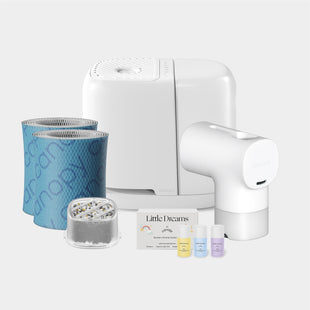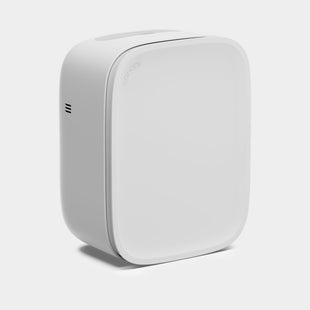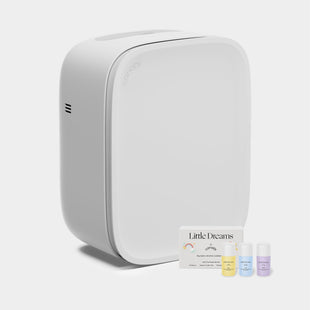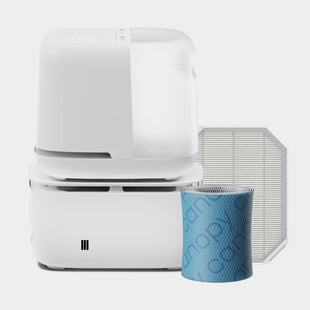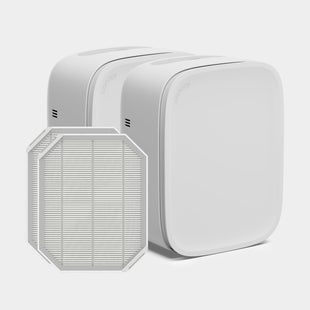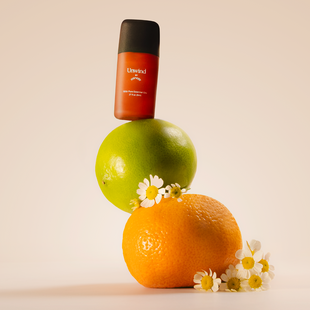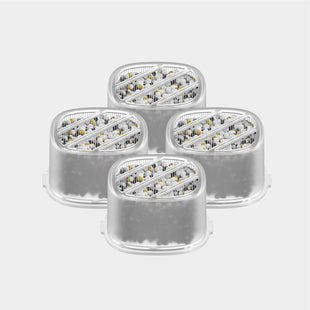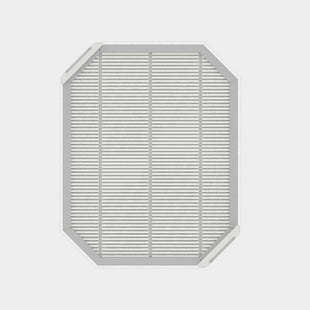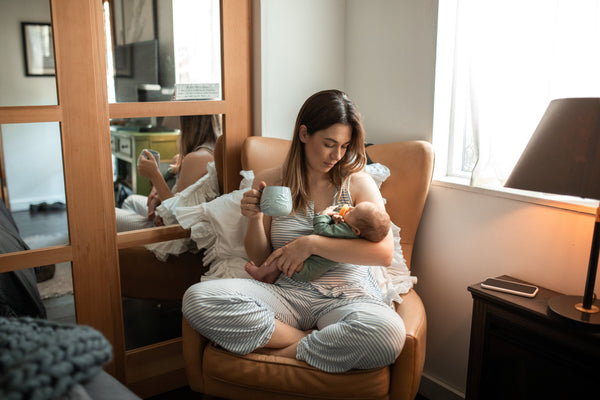This content has been reviewed and updated on February 12, 2024.
When you bring a new baby home from the hospital, you will be acutely attuned to every little noise or movement they make. Every tiny little coo or grunt will surely attract your attention—and some will have you flipping through the pages of your baby care guide or calling the pediatrician to find out if they’re normal.
One sound that might not get your attention right away is a sneeze. But when your newborn keeps sneezing, you might wonder if something’s wrong or your baby is already sick. We have good news: If your baby sneezes, everything is perfectly fine. In fact, sneezing is a normal, early-life reflex that keeps your newborn’s airways clear for easy breathing. You can rest assured that those sweet little sneezes are a positive sign of a developing respiratory system.
Why Do Babies Sneeze So Much?
Everyone sneezes. Whether it’s an extra sprinkle of pepper that tickles your nose or the early stages of a cold, sneezing is your nasal passage’s way of dealing with irritation. In most cases, a sneeze or two is nothing to worry about.
That also applies to newborns, who tend to sneeze more often than adults, sometimes several times a day. There’s a very good reason for this.
Early in pregnancy (usually between 5 and 6 weeks), the umbilical cord forms to deliver nutrition and oxygen to the developing fetus. From this point until their first cry after birth, you are helping your baby breathe.
Once babies are born, they still need to learn how to breathe. After all, they’ve spent 40 or more weeks floating in amniotic fluid and have never breathed air on their own. While it might be difficult for adults to imagine breathing being anything but an automatic and effortless process, newborns still need time to develop that skill. Sneezing is one way their body learns to regulate and improve their breathing.
But why is your newborn sneezing so much? There are four primary reasons why your baby sneezes frequently.
1. Clearing Clogged Airways
The first few months of life are a critical development period for an infant’s respiratory system. During this time, babies breathe primarily through their mouths. When they start to breathe through their noses, they can sneeze a lot as they get used to it.
Another issue when they start to breathe through their noses is congestion. When one or both nostrils are clogged, your baby may struggle to breathe. Sneezing is the body’s natural response to a blockage in the airway that can interfere with breathing.
While a baby can catch a cold and have mucus in their nasal passages, it’s more likely that lingering amniotic fluid from the womb, breastmilk, regurgitated milk, or saliva is clogging your newborn’s airway.
2. Reacting to an Environmental Irritant
 Everything is new to a brand-new baby, including the contaminants in the air that don’t affect adults—or that they don’t notice. Babies are still learning to breathe more efficiently and are sensitive to environmental irritants, like dust, pet hair, lint, perfume, cleaning chemicals, and general air pollution.
Everything is new to a brand-new baby, including the contaminants in the air that don’t affect adults—or that they don’t notice. Babies are still learning to breathe more efficiently and are sensitive to environmental irritants, like dust, pet hair, lint, perfume, cleaning chemicals, and general air pollution.
All these contaminants in the air can irritate your baby’s nasal passages, triggering the natural reflex to sneeze. It’s the body’s normal way of eliminating environmental irritants to breathe more easily. As your baby grows and develops more tolerance to whatever’s in the air, newborn sneezing will subside.
3. Reacting to Dry Air
Arid air is a problem for people of all ages, and it can wreak havoc on your respiratory system. Without sufficient environmental moisture, you can experience:
- Congestion
- Runny nose
- Excessive sneezing
- Dry throat or frequent coughing
- Nosebleeds
- Allergy flare-ups
- Dry skin
- Worsening skin conditions, like eczema or psoriasis
And those are the common symptoms of dehydrated air in adults. Can you imagine the impact of dry air on a newborn or infant? While the little sneezes might be a normal response, you don’t want your baby to have dry, itchy skin or any other issues due to dry air.
The optimal range of relative humidity (RH) for your home is between 40% and 60%. When RH levels sit below 40%, the dry air can cause discomfort. When RH levels exceed 60%, the surplus moisture creates a breeding ground for mold, dust mites, bacteria, and other unwanted contaminants. It is best to ensure humidity levels remain within optimal range to keep your family comfortable and healthy.
4. Coming Down With a Cold or the Flu
While it’s unlikely that a few sneezes are a sign that your newborn is sick, there is always a chance babies can catch a cold or the flu. Without a fully formed immune system, they’re susceptible to viruses that can make them ill.
With that in mind, call the pediatrician immediately if your newborn keeps sneezing and has additional symptoms, like a fever, cough, and runny nose.
To prevent your child from developing a cold or the flu, kindly ask family, friends, and loved ones to refrain from visiting your baby if they are sick, feel early symptoms of illness, or have recently been around someone else who is sick. Seasonal flu shots and frequent hand-washing can also help keep your baby healthy.
Why Do Infants Have Stuffy Noses?
In addition to frequent sneezing, it’s also common for newborns to have a congested or stuffy nose, often well into their sixth month. A stuffy nose can contribute to sneezes, and they are usually caused by:
- Amniotic fluid clogging the nasal airway: Babies take “practice” breaths in the womb from 10 weeks on. These practice breaths fill the lungs with amniotic fluid rather than oxygen. Remnants of amniotic fluid can remain in the nasal cavity after birth, clogging the airway.
- Tiny nose, small airways: Babies can sound congested even when not because they have small airways. A small airway can only suction a small amount of air, which makes their breathing sound stuffy.
- Deep breathing: While this sounds counterintuitive, deep breathing is an irregular occurrence in newborns. Deep breaths vibrate the nasal airway, which makes your sweetie pie sound stuffy, even if their passages are clear.
When to Call the Doctor
Mild congestion is normal, but it can be frustrating for babies and worrisome for parents. In most cases, congestion will clear up on its own through the body’s natural healing process. However, you should call a doctor if your newborn is sneezing a lot, their congestion interferes with feeding or nursing, or if your baby has a rectal temperature of 100.4 or higher.
At-Home Remedies for Baby Congestion

If your baby has no additional symptoms and all signs point to typical nasal irritation or congestion, you can try some effective at-home remedies to relieve and help your baby feel more comfortable.
Invest in a Quality Humidifier
Adding a humidifier to your child’s nursery can do a lot for their comfort and well-being and your peace of mind. Using a safe evaporative technology or cool mist humidifier hydrates the air to the ideal humidity level, offering babies a long list of benefits, including:
- Less congestion
- Less dry, itchy, or irritated skin
- Less severe cold and flu symptoms
- Soothing sound for sleep
Administer Saline Drops
Saline drops and a suction bulb are great medicine cabinet essentials for “just in case,” as they can help loosen mucus and ease congestion. Saline is a gentle purified salt solution that loosens mucus in the nasal cavity for easy breathing, and the suction bulb helps gently remove some of the mucus that the baby can’t blow out.
If your pediatrician recommends this approach, follow the dosage directions on the box and use a suction bulb to remove larger pieces of mucus from the nasal cavity. Saline drops and suction bulbs are an as-needed remedy that should be used sparingly.
Support Your Baby’s Well-Being With a Canopy Humidifier
When you want the best for your new arrival, a Canopy Nursery Humidifier is an unbeatable choice. Offering clean evaporative technology, Canopy humidifiers help maintain the perfect humidity levels. Unlike models that can create hot steam, you never need to worry about injuries, mold, or other potential safety risks.
You don’t need to worry about bacteria, as we add two fail-safes to protect you and your baby. Our devices contain UV lights that kill 99.9% of bacteria in the water tank, and the disposable paper filter stops any remaining contaminants from entering the air.
We also understand that families are busy, so we make taking care of your humidifier easy: The reservoir and tray are dishwasher-safe, and the rest of the unit only needs to be wiped clean.
Last but certainly not least is our filter subscription option. To ensure you have everything you need for clean, safe moisture, we offer a convenient subscription service, which auto-ships a new paper filter every 45 days.
Explore Canopy’s family of products, including the Nursery Humidifier and Humidifier Plus for large spaces and subscription options for filters and more, for healthy hydration that benefits the entire family.









